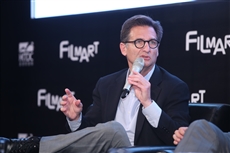Digital Revolution Bringing Boundless Opportunity
27 March 2018 – Digital technology is revolutionising film and entertainment, bringing boundless opportunity for content creators and storytellers through multiple channels and portals. This seismic transformation of the industry, with Asia at the epicentre of its most exciting new frontier, was the focus of the seminar “Content Without Borders: the New Landscape of Digital Production and Distribution,” held on 20 March, at the 22nd edition of the Hong Kong International Film and TV Market (FILMART) at the Hong Kong Convention and Exhibition Centre.
Organised by the Producers Guild of America and American Consulate General Commercial Service Guangzhou, the seminar featured a stellar lineup of Hollywood and Asian producer-distributors heralding a bold new era of a radically globalised digital landscape democratising when, where and how we watch entertainment. Maria Lo Orzel, Producer of Studio Strada, acted as the moderator for the seminar.
Digital Revolution Introduces New Distribution Technology
“This is a revolution bringing us new delivery systems and technologies. It’s a fast and furious game-changer bringing great opportunities,” said Michael Uslan, President of Strawberry Films, who is the executive producer of Batman v Superman: Dawn of Justice movie. He said the industry is no longer “governed by a few giant monolithic companies” with a stereotype output of five basic genres: 3D epics, blockbuster franchises, action films, R-rate comedies and cheap horror “made for American teenagers who play video games.”
Lamenting that cinema classics like Casablanca “could never get made today,” he hailed digital technology for heralding refreshing new opportunities for the world to “join hands and create globalised content for everyone.”
Yet despite the technological revolution – with on-demand and streaming services to anyone with an Internet connection upending the conventional distribution system of cinemas and TV – he stressed: “One truth remains: content is still king. Rule number one is story, so is rule number two, three and four.”
While the studios have “driven Hollywood talent out” into more interesting TV series roles, he said no wonder audiences are also switching to more ambitious and varied content on the likes of Netflix, with more than 150 projects currently underway, and Amazon.
Revolution is seldom without accompanying dangers, however, and on a cautionary note, he said: “I’m not sure if the glut of content for 24/7 consumption is sustainable. It’s a flashpoint that everyone needs to keep an eye on.”
But Mr Uslan is also convinced the digital revolution has only just begun. With the dawn of virtual and augmented reality, and gaming overtaking film in popularity and revenue, he added: “Ancillary markets are not so ancillary any more. The tail is starting to wag the dog with the marriage of mobile gaming and movies getting stronger and stronger. This will be another new game changer.”
Globalisation of Digital Content Distribution
By its borderless nature, ease of globalised distribution of digital content is also key to the future, with opportunity knocking loudest in China and elsewhere in Asia, said Tom Jacobson, President of the Jacobson Company and former President of Paramount Pictures, which is behind an accomplished portfolio of blockbusters, including Home Alone, Die Hard and Independence Day, and The Darkest Hour TV series.
Noting latest industry data, he pointed out that Hollywood accounted for about half of the world’s filmmaking in 1980, but Tinsel Town’s domination is now over. With more affordable technology, international production has in the meantime boomed, significantly in China and the rest of Asia, to account for more than 80 per cent of global releases.
For now, 75 per cent of all box-office revenue is scooped by the top 50 movies. But the tide is shifting and in a “golden age” for TV productions, he said internationalising content to maximise audience appeal is more crucial than ever.
This explains why Amazon, with a quantum leap in subtitling efficiency, can now launch new releases in 240 countries on the same day. At the same time, the Chinese mainland China box-office is booming, with 20 per cent growth last year alone, and revenue poised to overtake the United States in the next year or two. In the biggest and fastest-growing international market of all, he said: “The industry’s future is tied to China and Asia.”
China and Asia Embracing Digital World
The digital era is being embraced in the mainland China and elsewhere in Asia at a pace far outstripping anywhere else in the world, agreed two of the region’s leading producer-distributors, Jia Yao, General Manager of Beijing Wenxin Culture and Technology Co Ltd., one of the biggest producers of Chinese TV dramas, and Jennifer Batty, Chief Content Officer for HOOQ, a joint-venture of Sony Pictures, Warner Bros and Singtel bringing Asia's first premium video-on-demand streaming service.
Mr Yao cheered historic growth at the Chinese box-office, with revenue soaring from just one-seventh of the United States in 2010, to drawing almost level last year at around US$11 billion. The Chinese blockbuster franchise Wolf Warrior 2 recently grossed US$250 million in China alone, more than record-breaking Avatar achieved worldwide.
China’s hunger for entertainment, in tandem with phenomenal economic growth, is seeing 50,000 new theatres opening this year, branching out from major cities to remote rural provincial communities. Alibaba alone is opening 150 theatres.
“There is a lot more money flowing into the industry,” he said. With so many more distribution options, from new TV channels and online portals to video on demand and streaming, “we are seeing a lot of independent, new faces producing content.”
His company is now distributing to 180 countries, into a market of multiple channels, portals that can together, earn a single top drama episode up to US$150,000 – unheard of not so long ago. “In the old days, you could only sell to TV channels. Now there are a lot more platforms buying content. We are all really grateful for the digital revolution,” he added.
Ms Batty, based in Singapore for the HOOQ distribution network, said: “These are really exciting times, especially when you remember that 20 years ago there was only network TV and cable.”
An example of how dramatically the Asian market has changed is Indonesia – where fewer than seven per cent of the population has subscription TV to watch movies. “But because of digital, all 300 million have access, with the numbers in China probably more staggering,” she said.
Underlining the opportunities the revolution presents, HOOQ invited budding producers to submit ideas for a TV series, and six shortlisted pilots are being streamed, inviting social media feedback. One will ultimately be selected for production into a fully-fledged series for streaming on HOOQ. “It’s really exciting to see so much emerging talent,” she added.
FILMART website: http://m.hktdc.com/fair/hkfilmart-en
Entertainment Expo website: http://www.eexpohk.com
|
|
Michael Uslan, President of Strawberry Films, who produced the Batman movie franchise, says that digital technology brings fresh new opportunities for the world to create globalised content
|
|
|
Tom Jacobson, President of the Jacobson Company and former President of Paramount Pictures points out that internationalising content to maximise audience appeal is more crucial than ever
|
|
|
Jia Yao,General Manager of Beijing Wenxin Culture and Technology Company (top), and Jennifer Batty, Chief Content Officer for HOOQ (bottom), agree that the digital era is being embraced in mainland China and Asia at a pace far outstripping anywhere else in the world
|
|
|
Maria Lo Orzel, Producer of Studio Strada, acted as the moderator for the seminar
|
Media enquiries
Please contact the HKTDC's Communications & Public Affairs Department:
Banbi Chen Tel: (852) 2584 4525 Email: banbi.yc.chen@hktdc.org
Sunny Ng Tel: (852) 2584 4357 Email: sunny.sl.ng@hktdc.org
To view press releases in Chinese, please visit http://mediaroom.hktdc.com/tc
About the HKTDC
Established in 1966, the Hong Kong Trade Development Council (HKTDC) is a statutory body dedicated to creating opportunities for Hong Kong’s businesses. With more than 40 offices globally, including 13 on the Chinese mainland, the HKTDC promotes Hong Kong as a platform for doing business with China, Asia and the world. With 50 years of experience, the HKTDC organises international exhibitions, conferences and business missions to provide companies, particularly SMEs, with business opportunities on the mainland and in international markets, while providing information via trade publications, research reports and digital channels including the media room. For more information, please visit: www.hktdc.com/aboutus.






